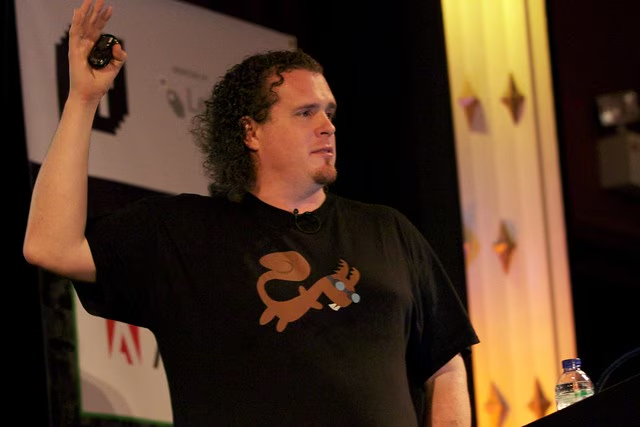Tales of Suckage and Awesomeness

Audio
DownloadVideo
Watch on YouTubeTalk description
This talk is an exploration of how the web has evolved since its humble beginnings in the early 1990s, from high and low points in the trenches of the Browser Wars to the enviable opportunities and sizable challenges we face today, and draws the connections between the choices made then and the landscape we find ourselves in today.
Session Summary
Chris Wilson reflects on the evolution of the web, weaving together cautionary tales of past design failures ("suckage") and brilliant breakthroughs ("awesomeness"). With wit and real‑world examples from early HTML experiments to modern browser engines, he underscores how missteps often spark innovation. The talk pulses with energy as he shares lessons learned, encourages optimism amid chaos, and celebrates the resilience that drives web development forward. This is a must‑see for anyone passionate about what the web was, is, and can become.
View detailed generated session topics, quotes and video timestamps
Tales from the Browser Wars: A Personal History of the Web
Introduction and Personal History (0m)
Chris Wilson begins by setting the context that whilst the previous speaker delivered a maths lesson, this will be a history lesson about the web platform and the first browser war. He introduces himself through a photo from 1993 at the first web conference ever held.
"I was about a year out of college like I graduated about a year before and I was in charge of the team the team being a graduate student and a couple of undergrads"
"we were a bunch of college students doing this"
Early Days at NCSA and Mosaic Development (2m12s)
Wilson worked at the National Center for Supercomputing Applications developing PC telnet before transitioning to web browser development. The team ported networking code to Windows to create Windows Mosaic, achieving remarkable early success despite the technical barriers of the time.
"I remember in a week we had a thousand downloads of our software and we thought this was amazing"
"Windows didn't have tcpip built into it until Windows 95"
Lesson 1: Freedom to Explore (8m)
NCSA's Software Tools Group had the freedom to explore beyond their core mission of supercomputer tools, which enabled them to develop web browsers. This flexibility proved crucial for innovation.
"having this freedom to explore things that aren't kind of your core Mission your core goal is a super important thing"
"the idea that you can go work on things that may not be directly related to your core mission is a really super important thing"
The Bold/Italic Tag Mistake (9m04s)
Wilson admits to creating one of his worst contributions to the web - allowing bold and italic tags to overlap improperly, breaking the structured nature of HTML parsing. This decision haunts him to this day.
"to this day I consider this to be my worst contribution to the world"
"a lot of why I keep working on browsers is to atone for this and try to make up for it"
The Great Tag Wars: Blink vs Marquee (17m)
The story of how Netscape engineers created the blink tag whilst drinking, and Microsoft's response with the marquee tag. Wilson notes the marquee tag was designed completely sober, making it perhaps more embarrassing.
"the really depressing part about this the part that has always depressed me about the marquee element is that it was designed and implemented tested and deployed stone cold sober"
"we don't have an excuse other than somebody thought it was a good idea"
Internet Explorer 4 and Dynamic HTML (23m)
IE4 represented a massive leap forward with its completely dynamic rendering engine, allowing real-time changes to any content on the page - something competitors couldn't match at the time.
"IE4 really did deserve to be super super successful it was very groundbreaking"
"it was an Amazing Leap Forward in power in what you could do on the client side in the web platform"
XMLHttpRequest Origin Story (34m)
The accidental creation of XMLHttpRequest for Outlook Web Access, smuggled into the msxml.dll because the IE team initially rejected it. This serendipitous addition would later enable the Ajax revolution.
"xmlhttprequest was mentioned earlier this was implemented in IE5 uh for Outlook web access"
"that's really why the XML part is at the beginning of this because you'll I mean I'm sure you know most uses of XML HTTP request are not in fact XML"
Web 2.0 and User Experience Focus (38m)
Wilson describes Web 2.0 as fundamentally being about caring for user experience rather than technology, marking a shift in how developers approached web applications.
"it was caring about your user experience like focus on the user experience not on the technology"
"it's time for the medium of the web to to basically to stop being like a weird printed page and at the same time to stop being a weird runtime"
Mobile Revolution and Platform Integration (39m)
The iPhone's arrival in 2007 transformed mobile computing, though initially the web platform couldn't access device capabilities. Wilson traces the evolution from his 1990s Windows Mobile device to modern smartphones with full web platform integration.
"in 10 years I went from having one of these bad boys to being able to hold my phone up in the air have it tell me what music I was listening to"
"integrating all these pieces in the real world is absolutely critical to building compelling user experiences"
About Chris Wilson
Chris Wilson has worked on NCSA Mosaic, IE and now Chrome as an Open Web advocate. He loves enabling awesome user experiences on the web.